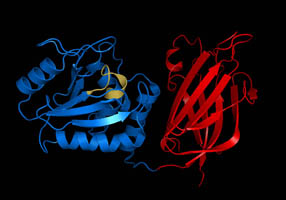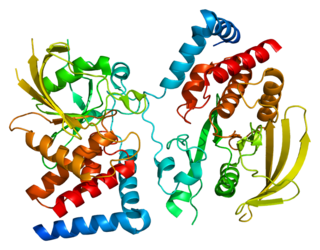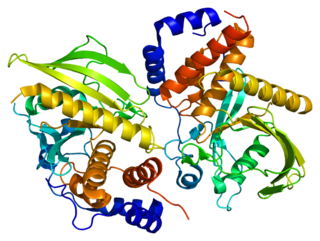
p53, also known as Tumor protein P53, cellular tumor antigen p53, or transformation-related protein 53 (TRP53) is a regulatory protein that is often mutated in human cancers. The p53 proteins are crucial in vertebrates, where they prevent cancer formation. As such, p53 has been described as "the guardian of the genome" because of its role in conserving stability by preventing genome mutation. Hence TP53 is classified as a tumor suppressor gene.

Phosphatase and tensin homolog (PTEN) is a phosphatase in humans and is encoded by the PTEN gene. Mutations of this gene are a step in the development of many cancers, specifically glioblastoma, lung cancer, breast cancer, and prostate cancer. Genes corresponding to PTEN (orthologs) have been identified in most mammals for which complete genome data are available.

Transcription factor Jun is a protein that in humans is encoded by the JUN gene. c-Jun, in combination with protein c-Fos, forms the AP-1 early response transcription factor. It was first identified as the Fos-binding protein p39 and only later rediscovered as the product of the JUN gene. c-jun was the first oncogenic transcription factor discovered. The proto-oncogene c-Jun is the cellular homolog of the viral oncoprotein v-jun. The viral homolog v-jun was discovered in avian sarcoma virus 17 and was named for ju-nana, the Japanese word for 17. The human JUN encodes a protein that is highly similar to the viral protein, which interacts directly with specific target DNA sequences to regulate gene expression. This gene is intronless and is mapped to 1p32-p31, a chromosomal region involved in both translocations and deletions in human malignancies.

CHEK2 is a tumor suppressor gene that encodes the protein CHK2, a serine-threonine kinase. CHK2 is involved in DNA repair, cell cycle arrest or apoptosis in response to DNA damage. Mutations to the CHEK2 gene have been linked to a wide range of cancers.

Jun dimerization protein 2 (JUNDM2) is a protein that in humans is encoded by the JDP2 gene. The Jun dimerization protein is a member of the AP-1 family of transcription factors.

DNA topoisomerase IIα is a human enzyme encoded by the TOP2A gene.

Metastasis-associated protein MTA1 is a protein that in humans is encoded by the MTA1 gene. MTA1 is the founding member of the MTA family of genes. MTA1 is primarily localized in the nucleus but also found to be distributed in the extra-nuclear compartments. MTA1 is a component of several chromatin remodeling complexes including the nucleosome remodeling and deacetylation complex (NuRD). MTA1 regulates gene expression by functioning as a coregulator to integrate DNA-interacting factors to gene activity. MTA1 participates in physiological functions in the normal and cancer cells. MTA1 is one of the most upregulated proteins in human cancer and associates with cancer progression, aggressive phenotypes, and poor prognosis of cancer patients.

Protein NDRG1 is a protein that in humans is encoded by the NDRG1 gene.

Apoptosis-stimulating of p53 protein 2 (ASPP2) also known as Bcl2-binding protein (Bbp) and tumor suppressor p53-binding protein 2 (p53BP2) is a protein that in humans is encoded by the TP53BP2 gene. Multiple transcript variants encoding different isoforms have been found for this gene.

Protein phosphatase 1 regulatory subunit 15A, also known as growth arrest and DNA damage-inducible protein (GADD34), is a protein that in humans is encoded by the PPP1R15A gene.

40S ribosomal protein S16' is a protein that in humans is encoded by the RPS16 gene.

Dual specificity protein phosphatase 3 is an enzyme that in humans is encoded by the DUSP3 gene.

Serine/threonine-protein kinase VRK1 is an enzyme that in humans is encoded by the VRK1 gene.

Serine/threonine-protein kinase PLK2 is an enzyme that in humans is encoded by the PLK2 gene.

Receptor-type tyrosine-protein phosphatase gamma is an enzyme that in humans is encoded by the PTPRG gene.

Tyrosine-protein phosphatase non-receptor type 9 is an enzyme that in humans is encoded by the PTPN9 gene.

60S ribosomal protein L13 is a protein that in humans is encoded by the RPL13 gene.

Dual specificity protein phosphatase 16 is an enzyme that in humans is encoded by the DUSP16 gene.

Protein CIP2A also known as cancerous inhibitor of PP2A (CIP2A) is a protein that in humans is encoded by the KIAA1524 gene.

Etoposide-induced protein 2.4 homolog is a protein that in humans is encoded by the EI24 gene.






















